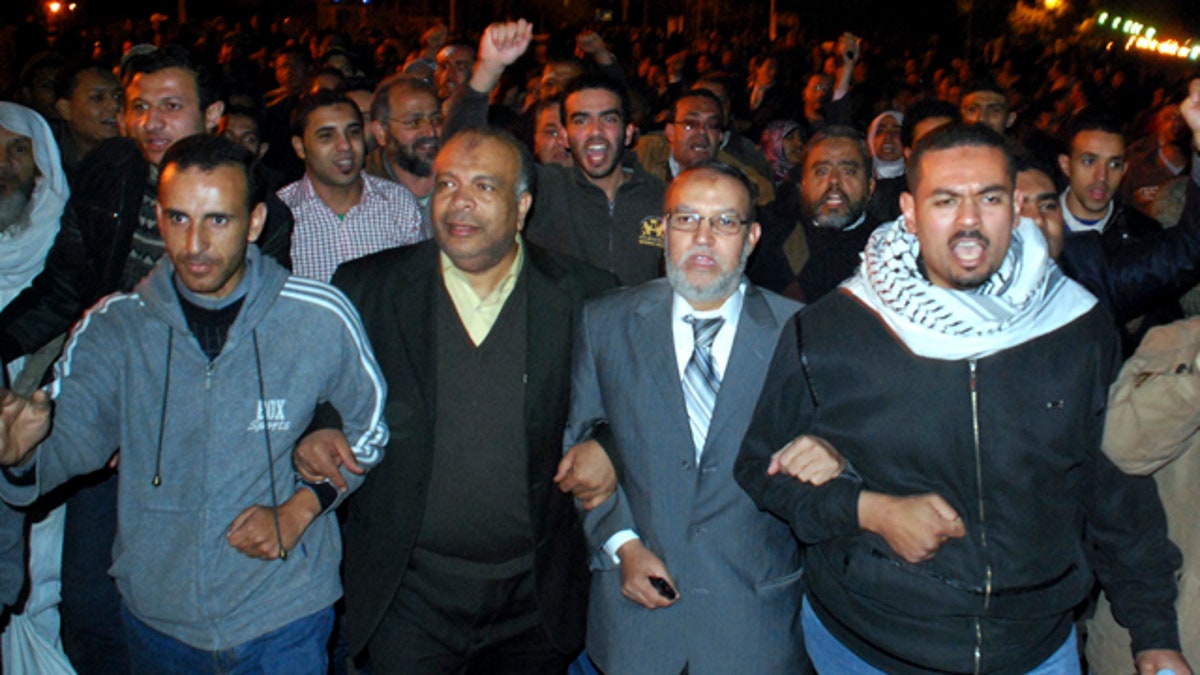
Jan. 30, 2011: Egyptian Brotherhood seniors Essam el-Erian, centre right, and Saad el-Katatni, centre left, take part in a protest in Cairo, Egypt.
BRUSSELS – Egypt needs to build a peaceful transition to democracy, European Union governments said Monday, urging President Hosni Mubarak's government to end its violent crackdown on demonstrators and allow an open dialogue on the country's future.
The 27-nation bloc urged "the Egyptian authorities to embark on an orderly transition to a broad-based government with full respect for the rule of law, human rights and fundamental freedoms."
The statement issued after the monthly meeting of European foreign ministers said this should pave the way to "free and fair elections" — but it stopped short of calling for Mubarak to resign.
The bloc has traditionally had close relations with Egypt as part of its partnerships with other Mediterranean nations and its citizens flock to Egyptian beaches in winter. In recent days, however, it has sought to distance itself from Mubarak's regime but been criticized for not directly challenging the 82-year-old leader's iron-fisted rule.
British Prime Minister David Cameron told the BBC that Mubarak must choose his response carefully to the demonstrations.
"There needs to be a proper, orderly transition to a more democratic situation, where there are greater rights, greater freedoms, better rule of law," Cameron said. "This repression — if you opt for that, that will end badly for Egypt, badly for the world. It is the wrong choice."
Cameron, however, did not directly call for Mubarak — a key Western ally for the past 30 years — to step aside, as demonstrators have demanded.
"It is very important that, whether it is President (Barack) Obama or me, we are not saying who should run this country or that country," Cameron said.
In Israel, President Shimon Peres said "we always have had and still have a great respect" for Mubarak. "I don't say everything that he did was right, but he did one thing for which all of us are thankful to him: He kept the peace in the Middle East," Peres said.
International Mideast envoy Tony Blair, speaking during a visit in Israel, said he was concerned that unrest in Egypt could disrupt the Israeli-Palestinian peace process.
Many EU diplomats piled the pressure on Mubarak.
"We're talking here about a rightful concern — particularly of the middle class, namely the opportunity to advance, democratic rights, civil rights," said German Foreign Minister Guido Westerwelle.
EU foreign policy chief Catherine Ashton urged the government in Cairo to listen and respond to the "legitimate grievances" of Egyptians.
"Their aspirations for a just, for a better future should be met with urgent, concrete and decisive answers and with real steps," she told reporters.
Some European foreign ministers warned Egyptians to be on guard against a possible takeover by religious militants.
"I am sure Egyptians will be in a position to choose democracy and civil rights, not extremism, not radicalism," Italian Foreign Minister Franco Frattini said.
The ministers had to paper over differences on how to treat Mubarak's government, according to a diplomat who spoke on condition of anonymity in line with standing rules. Some nations wanted the bloc to urge the strongman to step down, while others wanted to give him more time to form a transitional government.
Ministers also discussed the possible evacuation of more than 50,000 EU citizens currently in Egypt, most of them tourists, but refrained from urging Europeans to leave the country. In contrast, the U.S. has urged its citizens to leave Egypt.
Portuguese Foreign Minister Luis Amado urged the EU to adopt a more strategic approach to the upheavals in the Middle East, and not just limit itself to considering the situations in Egypt and Tunisia.
"These indications are so serious, so deep, with such a huge impact on geopolitical balances in the region, that we need to reflect comprehensively about what is going on in the region and what will be the future of the European Union's relations with the Arab and Islamic worlds," he said.
Leaders in Asia, meanwhile, were cautious.
China's Foreign Ministry said Beijing hopes normalcy and stability will be restored in Egypt soon. The Japanese and Indian foreign ministries issued similar statements.
___
Associated Press correspondent Raf Casert contributed to this story.
